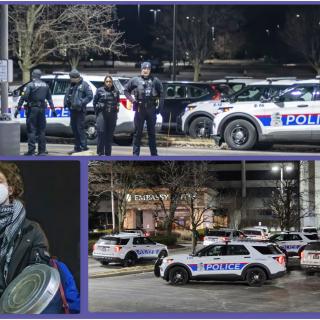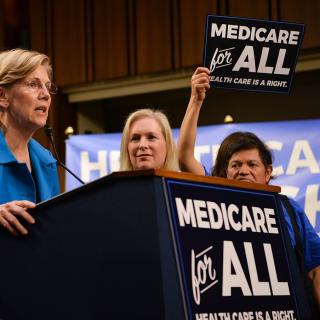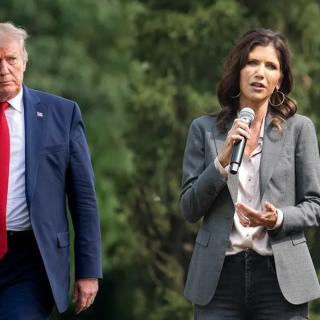Advertisement
Leave it to Sarah Palin, of all people, to play unwitting court jester, and speak aloud that which we all would rather have left unsaid. On November 11, in an interview on NBC, she said “I love the commercialization of Christmas because it spreads the Christmas cheer.” This statement of course, is rather gauche for us concerned liberals, who like to concern-troll about about the “true meaning of Christmas” and then turn around and snark on Christianity itself. But part of the reason her statement is so horrifying is that it's not wrong. The commercialization of Christmas helps spread the Christmas cheer because they are one in the same.
Indeed, the commercialization of Christmas is seen to be a universal bad, the only time it is socially acceptable to rail against capitalism. Inasmuch as we expect Christmas to be about some actual values, commercials that tell parents to give up on any gift that involves personal effort, or some form of unquantifiable love, and instead just buy the the new phone from Verizon churns our stomachs, and rightly so. They seem in violation of something, some ineffable spirit of this time of year. But what is the true meaning of Christmas? Well historically, it would be the celebration of our lord and savior Jesus Christ, as apocryphal as that birth may be (Saturnalia is the real reason for the season, of course). Inasmuch as the occasion of Christmas takes on anything resembling the sacred, it is because of its direct relation to Christianity. For everyone who doesn't believe that Jesus Christ is the literal son of God, Christmas really is nothing more than a celebration of capitalism, as evidenced by its secular avatar, Santa Claus.
Far from what Megyn Kelly and cohorts proffers, the current incarnation of Santa Claus has nothing to do with St. Nicholas and giving gifts to the poor, and all implications of socialism therein. What Santa Claus is about is the formulation of capitalism as a moral system. Santa Claus is the invisible hand of the market, made visible. People who imagine capitalism to be a moral system claim that the market rewards good behavior and punishes bad. It is important to inculcate children into this system, and so children who are good are rewarded with bounties of luxurious consumer goods, and children who are bad receive nothing. Curiously left out, are the children who live in apartments, homeless shelters, shantytowns and all other dwellings sans chimneys. These children have no place in this system. Such as it is in the real world. And of course, this moral distribution of inequality is presided over by a benevolent patriarch who runs a factory staffed with happy slaves. Damn, I guess Santa really does have to be white.
None of this mythos developed by accident. Most of our popular understandings of Santa Claus come from Washington Irving and Thomas Nast, two people who created much of the wonderful folklore and imagery instrumental in forging an American identity. Santa Claus as industrial capitalist came up in post-Civil War times, right as the Industrial Revolution was taking hold and as there was a surge of nostalgia for lost Southern plantation societies. The myth of Santa Claus fits in rather nicely with all those American notions about how if you work hard and play by the rules then you will be duly rewarded. The image and myth of Santa Claus was promulgated primarily through advertising departments, and today, it has gone global. In Kyrgyzstan, they named a mountain after Santa Claus after a Swedish engineering firm decided that said mountain would give Santa the most efficient delivery route. Thomas Friedman would be humbled.
And it is Santa, this avatar of the self-regulating market, that is responsible for spreading the Christmas cheer. Because what is Sarah Palin's Christmas cheer? The spirit of giving? And how is this spirit by and large made manifest? By giving an annual boon to a system that steals from all of us. How is “Christmas cheer” substantively different than the general aura of serenity through consumption fed to us by Madison Avenue throughout the rest of the year?
Please forgive my Christmas critical theory humbuggery though. I'm just another guy trying to find the true meaning of Christmas from a place that's not television specials or historical fiction, what is it about us that makes us embrace this extravagant ritual of self-delusion with such enthusiasm. Because I really do want it to be sacred. Not as some liberal milquetoast revisionist telling of the Christmas story as an allegory for the miracle of birth, but as a genuine, spiritual celebration of life and family and winter. Such a celebration is something America doesn't have, but desperately needs, judging by our persistent efforts to transfix one onto existing holidays.
But what else are we to expect from a nation whose very existence is predicated on displacement, appropriation and the ever-consuming need for more? We took it as God's work to eradicate all the cultures that genuinely celebrated life, and what we are left with is, like in so much of American culture, a pale representation of the real thing.
You may call me a Grinch, but what is the Grinch? A differently-colored man exiled from Whoville for no discernible reason, whose rage is essentialized, who must go on a campaign of re-appropriation, what some would call terror, in order for his pain to be noticed. The structural violence of our lives, of our collective self-identity, extends to Christmas as well.
Address all hate mail to petermgunn@gmail.com



